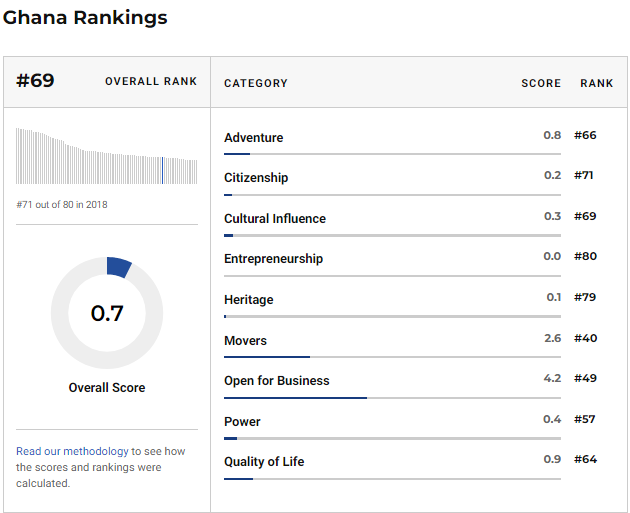A joint project by digital news service US News & World Report, marketing company Y&R and the Wharton School, a business school at the University of Pennsylvania about the perceptions of 80 countries has named Ghana the 69th ‘best country’ in the world.
The annual Best Countries rankings ranked countries based on perceptions about Adventure, Citizenship, Cultural Influence, Entrepreneurship, Heritage, Movers, Open for Business, Power and Quality of Life.
The country recorded its highest score; 4.2 out of 10 under the metric – ‘Open for Business’ on account of perceived cheap manufacturing costs, a lack of transparency in government practices and a relatively favourable tax environment.

Ghana’s lowest score 0.0 was recorded under ‘Entrepreneurship’ as a result of a perceived difficulty in acquiring capital, a poorly educated populace and the lack of a skilled labour force among other factors and lack of support for Entrepreneurs from the government
Ghana ranked ahead of other African countries including Tunisia (72), Nigeria (74) and Angola (78) but behind Egypt (40) and South Africa (37).
Switzerland for the third consecutive year was top of the ranking.
Japan was second (three places from last year), while Canada came third. The top ten in the 2019 rankings was completed by Germany, the United Kingdom, Sweden, Australia, the United States, Norway and France.
CLICK FOR THE FULL DETAILS FOR GHANA
Methodology
The study and model used to score and rank countries were developed by BAV Group and The Wharton School of the University of Pennsylvania, specifically professor David J. Reibstein, in consultation with U.S. News & World Report.
A set of 65 country attributes – terms that can be used to describe a country and that are also relevant to the success of a modern nation – were identified. Attributes by nation were presented in a survey of more than 20,000 people from across the globe. Participants assessed how closely they associated an attribute with a nation.
Each country was scored on each of the 65 country attributes based on a collection of individual survey responses. The more a country was perceived to exemplify a certain characteristic in relation to the average, the higher that country’s attribute score and vice versa. These scores were normalized to account for outliers and transformed into a scale that could be compared across the board.
Survey Participants
A total of 20,301 individuals from 36 countries in four regions – the Americas, Asia, Europe and the Middle East and Africa – were surveyed. Of the respondents, 11,238 were informed elites and 5,963 were business decision-makers. Some respondents were considered both informed elites and business decision-makers.




